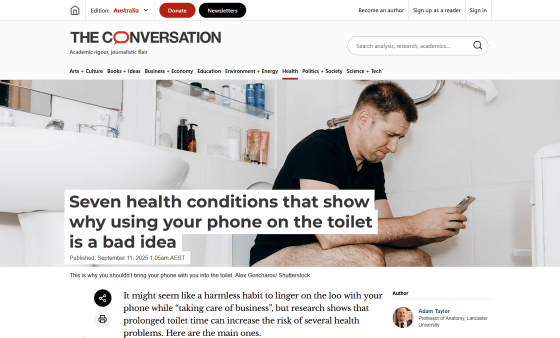What are the '7 health problems' that occur when you sit on the toilet for too long while pooping?

Many people tend to sit on the toilet for a long time, watching videos or playing games on their smartphones while using the toilet. However, sitting for too long can cause various problems, so
Seven health conditions that show why using your phone on the toilet is a bad idea
https://theconversation.com/seven-health-conditions-that-show-why-using-your-phone-on-the-toilet-is-a-bad-idea-264808

◆1: Hemorrhoids
Hemorrhoids are a well-known bowel-related condition, and a 2025 study found that people who use smartphones on the toilet have a 46% higher risk of developing hemorrhoids. Hemorrhoids are generally caused by increased pressure in the spongy tissue surrounding the anus, known as anal cushions , during bowel movements, causing blood vessels to dilate.
Symptoms of hemorrhoids include painless bleeding from the anus, irritation, itching, and discomfort, but it is estimated that 50-85% of people worldwide have hemorrhoids, including those who do not have symptoms.Hemorrhoids can also cause complications such as anemia due to prolonged hemorrhoids and incarcerated hemorrhoids, which are hemorrhoids that protrude from the anus and cannot be retracted.
◆2: Anal fissure (anal fissure)
The inner wall of the anus is thin, so if you sit on the toilet for a long time, blood will accumulate and stretch the inner wall, making it more susceptible to damage when stool is expelled. This can result in an anal fissure , a small tear in the inner wall of the anus. When you have an anal fissure, you will experience pain like broken glass coming out and fresh blood when you defecate.

◆3: Prolapse (anal prolapse, rectal prolapse)
Sitting on the toilet for too long increases the risk of not only stool but also your rectum protruding out of your body. This condition is called rectal prolapse, and in one case, a man's rectum
Sitting on the toilet for long periods of time increases abdominal pressure, which in turn increases pressure on the pelvic floor muscles, which are responsible for holding internal organs, including the rectum, in the abdomen. Prolonged pressure on the pelvic floor muscles weakens them, making it easier for the rectum to protrude, and in women, other pelvic organs, such as the uterus, may also protrude. Prolapse is often painful, so patients should see a doctor for reinsertion, and in severe cases, surgery may be required.
◆4: Bedsore
Bedsores , also known as 'bed sores,' occur when blood circulation is restricted on the surface of the bed that comes into contact with the bed, causing necrosis of the surrounding tissue. Elderly people, in particular, can develop bedsores simply by sitting on the toilet for long periods of time.

◆5: Hiatal hernia
◆6: Toilet seat nerve disorder
Sitting on the toilet for a long time can put pressure on major blood vessels and nerves, reducing blood flow to the legs and causing paralysis. This phenomenon, known as toilet seat neuropathy , usually subsides within a few minutes. However, there have been reported cases of people losing consciousness on the toilet after drinking alcohol and waking up to find that their entire body was paralyzed, as well as a man who fell asleep on the toilet and developed gangrene and sepsis, resulting in his death.
◆7: Fainting
If you strain for too long while trying to defecate on the toilet, you may experience a drop in blood pressure when you stand up, causing you to feel dizzy or even faint. This is called vasovagal syncope , and occurs when straining for too long stimulates the vagus nerve , which controls heart rate and blood pressure.

'To reduce your risk of suffering from these symptoms, try to spend as little time as possible sitting on the toilet, and consider changing your posture when using the toilet,' said Taylor. 'Other advice would be for people whose bowel movements often take more than five minutes to go to eat more fibre and drink more water, both of which will help promote healthier bowel movements and reduce straining.'
Related Posts:
in Science, Free Member, Posted by log1h_ik







